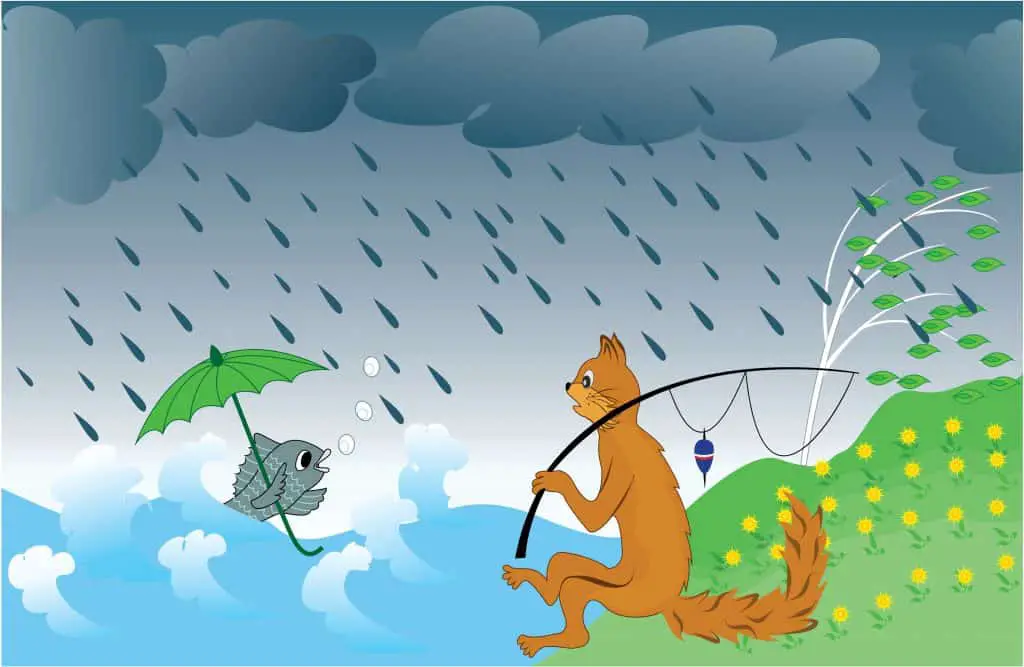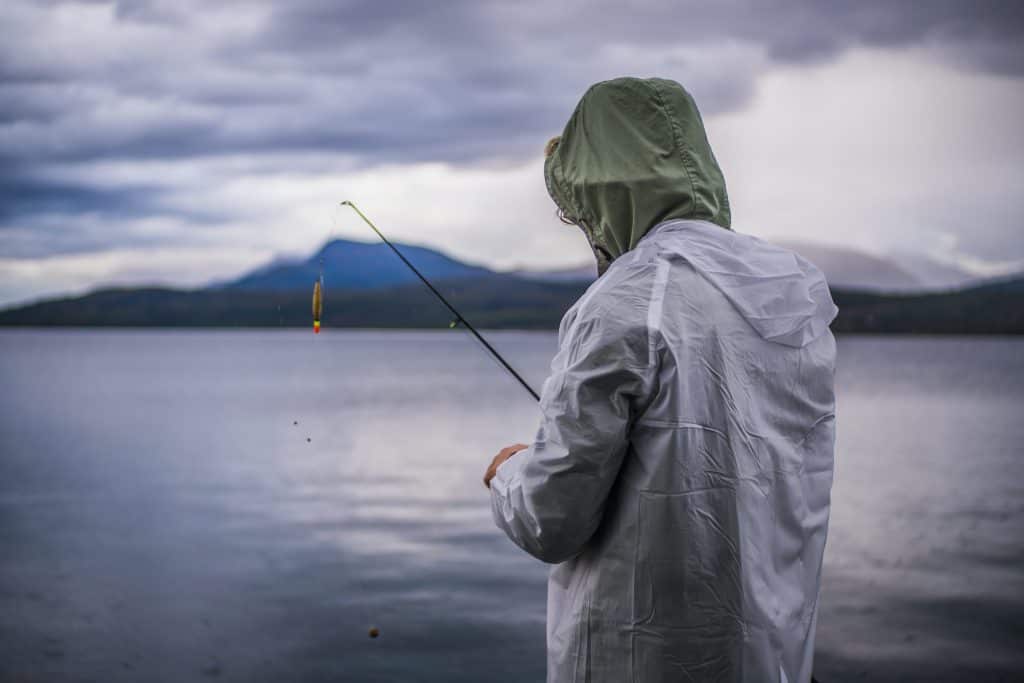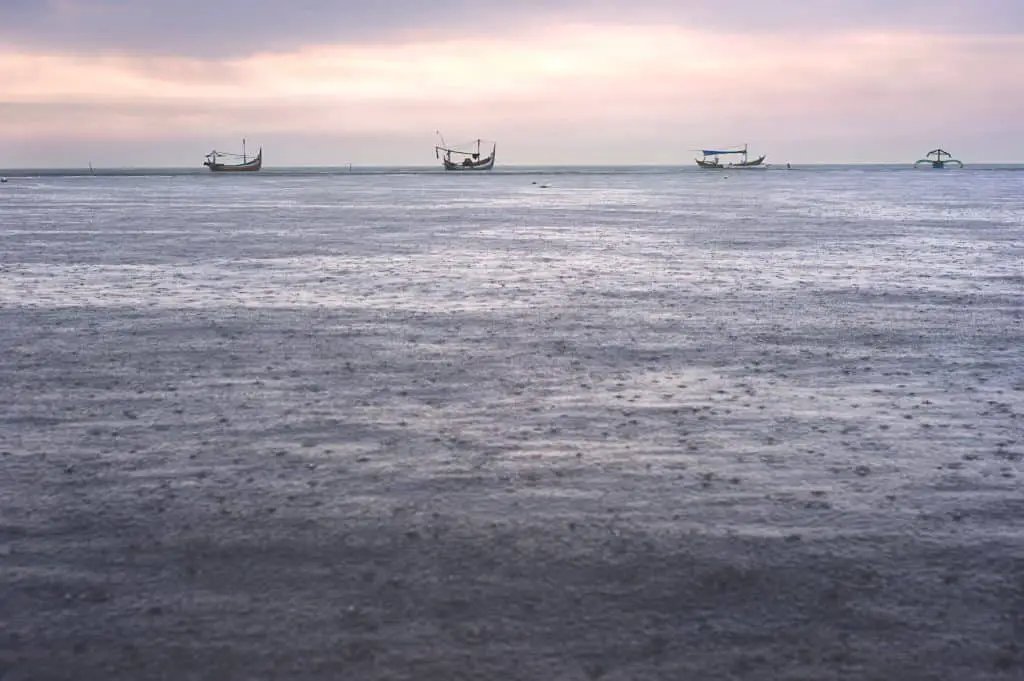Is fishing your favorite pastime? For many people reeling in a 20-pound striper or seeing a beautiful salmon swimming by is enough to get excited. Avid anglers don’t need any convincing when it comes to a fishing excursion. A critical factor to consider before going fishing is the weather forecast. Some people look for the perfect sunny day to go out fishing.
Unfortunately, not every day can be perfect weather-wise. High temperatures can bring humidity and thunderstorms. Though it is not advisable to go fishing when there is lightning and thunder abound, it is not dangerous when it is raining. So is fishing in the rain good? Rain can break up the surface and create a current that can get you many bites from the fishes.

Should you go fishing in the rain?
Anglers are luckier than other outdoor enthusiasts because rain does not automatically ruin their day. Your chances of catching fish can even improve when it is raining. When you see dark clouds on the horizon, it is time to pick up your fishing gear and head to the nearest fishing spot.
- You will have less competition. Not many anglers are going to brave the weather and try to catch the fish from the same spot as you. This improves your chances of catching a good amount of fish.
- Rain increases the chances of catching fish further, as the fish are in high spirit of hunting for food. In this hunt, they let down their guard, which makes it a perfect time for anglers to go for their hunt in turn.
- Rain brings out all the nutrients in the water, which makes fish move toward the top of the water. This, in turn, acts as an advantage for the anglers.
Difficulties you might face while fishing in the rain
Although there are varied advantages to fishing while it’s raining, it has its drawbacks. Here are a few flaws:
- When it pours, it becomes difficult to see the water clearly, which makes the job on hand more difficult.
- While it rains, the wind oftentimes picks up as well, potentially making handling the gear a problematic task.
- Not only do you get wet, but so does the ground. Make sure to watch out for muddy and slippery areas, especially when approaching a body of water, to avoid getting hurt.
- Not many people enjoy getting or being wet. When you decide to go fishing when it is raining, be prepared to get wet. Wet clothes bring discomfort and restrict your movements.
9 Tips to Make Fishing in the Rain Better
With that out of the way, here are some great tips to make a rainy day out a wonderful one:
But you don’t have to work hard to catch the fish, as the fishes would be on the hunt for food and would have let down their guard. So you can easily catch the fish.
1. Good Rain Gear is a Must
If you want to have a good time, you must ensure that you remain warm and comfortable. If you are shivering and your teeth chatter, you will not be able to concentrate on the fishing. Investing in high-quality rain gear can protect you from the heaviest of rains. Cheap ponchos or raincoats are alright for drizzles but will leave you soaked in heavier showers.
Buy good quality and preferably separately, a jacket and pants. Another important part of the raingear is the waterproof boots to keep your feet dry at all times. Consider a face shield, especially, if it is very windy or cold. Finally, bring a waterproof tackle box!
2. Fish Right Before The Storm
Just before the rains start, the low barometric pressure can send the fishes into a frenzy. While it rains this feeding frenzy is on its peek, it may slow down and again pick up after the storm passes. The best time for you to catch plentiful fishes is when they are all clamoring for food and moving about a lot.
3. Find Clear Water or Drains
When it starts to rain heavily, the rainwater starts to flow across the land. While flowing, it picks up sediments and dumps them into the waterbody you are fishing in. This can make it muddy and make fishing quite tricky. You must try to find clear water by moving away from the areas where the primary streams are. Sheltered coves or other protected locations are where you will find many fishes.
Still, you must also understand that the surface runoff also brings nutrients to the water. These nutrients are attractive to the baitfish and, in turn, to the bass. You can look at areas where the water is flowing into the lake, more so, if it is somewhat clean.

4. Use Topwater Lures and Experiment
Topwater lures are easy to use, but they don’t work well in all situations. They are most effective in early mornings or late afternoons. However, they are the best option when it is raining. Though most topwater lures are good, using lures that create some commotion on the surface is the best option.
Fishing in the rain requires some experimentation from your side, especially when it comes to lures. Lures that are effective on a lake or river may not yield the same results when it starts raining. Sometimes just changing the lure color can bring good results, some are big, make a lot of noise, and are splashy, and opting for these could give you the desired results.
5. Follow the Wind
Heavy rains can disrupt the fishes’ standard moving patterns and maybe do so in places you don’t expect. It can make finding the fishes quite difficult. When it comes to bass, finding the baitfish is enough because bass will be following closely. Smaller fish tend to get tossed around and are usually found on the downwind side of the waterbody. They also use currents as resting spots where they may escape nature’s fury. Follow the wind and find areas for catching more fishes downwind.
6. Winter Rain or Summer Rain
In the winter, the water is already high and cold, and rains will not significantly improve your catching fish chances. However, when it is warm and summery, and the water level is down, steady rain is an invitation to drop everything else and pick up your fishing rod. It is essential to understand this difference. Otherwise, you could be waiting miserably in the cold rain and get nothing to show for it.
7. Water Temperature
Rains can change the water temperature quite drastically. If a cold front moves in during summer weather, it quickly brings the water’s temperature down. This makes the fish come up to feed more.
On the other hand, warm rain can increase the water temperature, which is advantageous in the year’s cool seasons. Rain does not affect the deeper water extensively, so if you cannot find fishes with the water temperature change, you might still be able to see them in the deeper water. Deeper water offers a more comfortable climate to the fishes.
8. Fish Smart
If you want your fishing experience to go well, then you must do some smart planning. The best anglers consider a lot of factors before they venture out, be that tides, water temperature, their familiarity with the area, the weather and countless more. The better you prepare, the more likely you are to catch fish. Nevertheless, there is also nothing to be said against simply going with it 🙂
9. Be patient
Light rains can discourage some people from fishing, but they don’t realize that it is an excellent opportunity to catch fish. Still, especially when you are out there alone getting soaked and the fish just won’t bite, remember these tips and always stay patient.

Is Fishing in the Rain Good? Frequently Asked Questions (FAQ)
Is fishing good during rains?
You may not believe it, but yes, fishing is better when it is raining. However, other factors are also equally important and must be looked at carefully. For example, you might think about fishing at night. Don’t let a little rain deter you from going fishing though!
Is it best to fish before or after the rain?
Fishing is better before the rain since the conditions are just right for fish like bass and trout to come out and feed aggressively. This gives you a chance to get a good haul.
Is it safe to fish right before a storm?
Though the conditions are perfect for fishing before a storm hits the area, it is the safety that comes first. If there is lightning and thunder, then it is best to be safe and wait it out. Especially if there is a hurricane warning, make sure to prepare and stay safe!